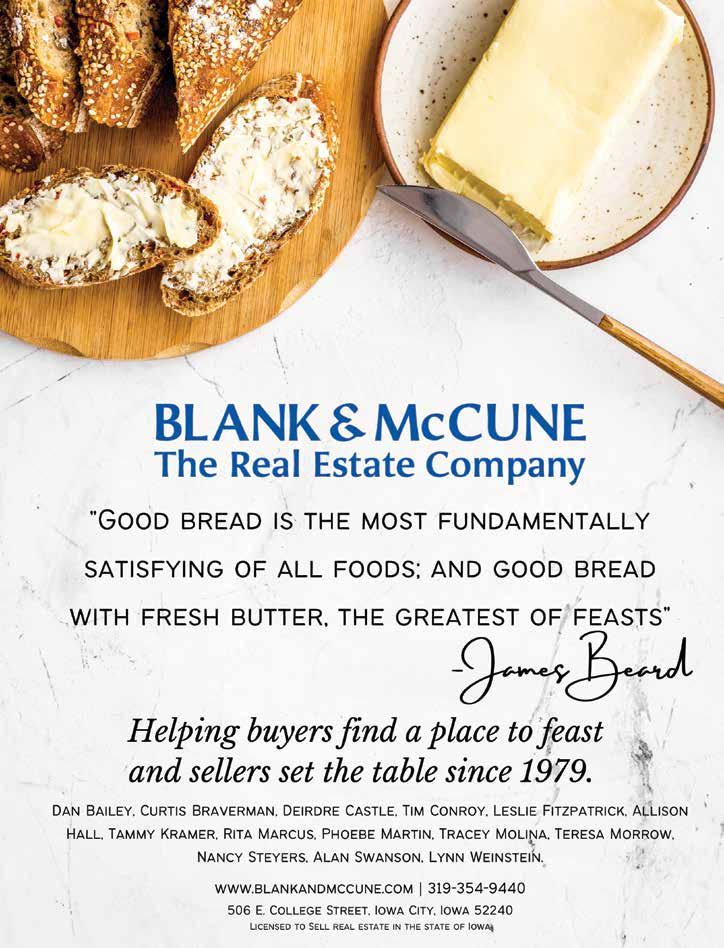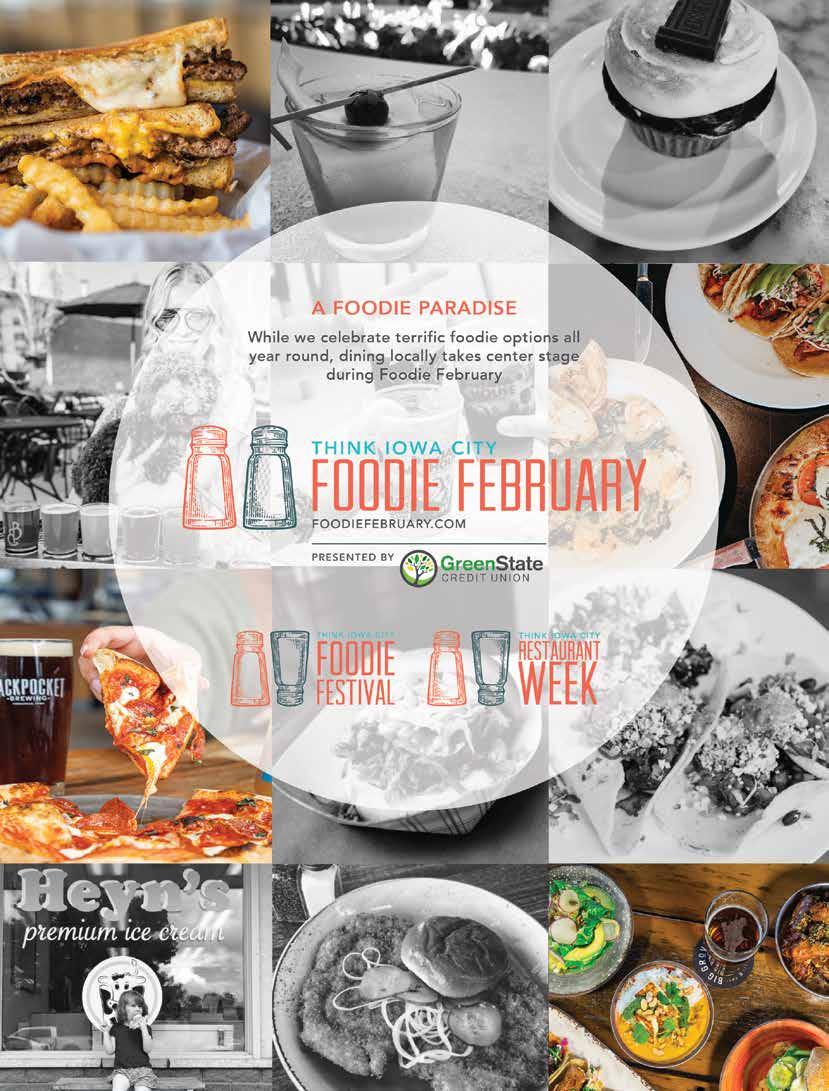
15 minute read
Mini But Mighty
Micro food Operations
Starting small and enjoying the ride proves to be the right path for these local food businesses.
Advertisement
BY ZOE PHARO
The COVID-19 pandemic taught many of us how to switch gears and pivot. In March 2020, as the regular 9-to5 ruptured, many people quit their desk and retail jobs and started doing the things they’d always wanted to do, either as a side hustle or completely new beginning.
“As a person who works in the service industry, the pandemic annihilated your way of life,” said Sam Caster of Brass Ring Coffee, an Iowa City-based micro-roaster. While activity in shops died down, online orders spiked and home-grown businesses saw an opening.
Colleen Brennan of Bread Worthy Bakery and her husband Erik Dole were both working in a hotel restaurant when COVID hit, and they were asked to work weird hours, accept pay cuts, and take on new responsibilities as middle management and opportunities for growth vanished. “It was a terrible environment,” she said, recalling that they had looked at each other and agreed they couldn’t stay any longer.
After years of living abroad and completing pastry school, they chose to settle in Iowa City, an intentional choice for starting their bakery. “Iowa had both the cottage food and the home bakery license,” Brennan explained. These laws are actually quite rare in their flexibility for bakers, and Iowa is one of the only states with a home bakery license.
The cottage food license allows you to sell out of your house or at the farmer’s market, however you cannot deliver, sell wholesale, or make goods that need to be refrigerated. The home bakery license allows for delivery, wholesale and refrigerated goods, but sales must be capped at $35,000.00. Obtaining the licensing for a cottage food set-up is relatively simple in Iowa, Brennan said, and “it’s great because it’s a low start-up cost, and it’s a great way to start actually getting customers and getting a loyal fan base that is very cost-effective because you’re not paying rent,” she continued.
Many of these “micro-food” or “underground” operations get their start on Instagram. “The micro-food community is one of the most accepting, nicest communities out there,” Brennan remarked. “If you message anyone a quick question, people are so willing to be like, ‘Here’s a recipe, let me help you.’”
Or they begin at a local Farmers Market, which was the case for both Brass Ring Coffee and Bread Worthy Bakery. Farmers Market experienced numerous hiatuses during the pandemic, but this year will operate again from May to October in the Cedar Rapids and Iowa City area. Vendors often barter and trade items at the market, making it a particularly collaborative environment for newbies and upstarts.
Again and again, these businesses emphasized that though these ventures can be stressful, they are more about the fun of it and savoring slow progress. Constellation Coffee is one of many ventures in the micro world that relishes the slow process. Brought to life by Wake Up Iowa’s Jarrett and Cristin Mitchell, Constellation offers coffee subscriptions as well as bags of beans both ground and whole delivered to your home. Cristin said, “It’s fun to have all the incubation happen within our home and just be creative with each other.”
Jarrett mentions the micro model has also provided them flexibility. “When it’s just direct-to-consumer, it can be more reflexive to the commodity market, as well as to consumer demand.”
Often these micro-operations start out smallscale, but quickly grow. “Last week was actually our biggest week ever—and so it was getting to the point where I was like, ‘I don’t know how I’m going to do all this,’” said Sam Caster. Marian Trochez of Elida’s Bakery, which opened in April 2020, echoes a similar sentiment, noting they’ve seen the number of orders they’re receiving increase every week. Abbey Uhlenhop of Second Rise Bakery recently felt the need to take a break from her home baking operation. She was saying yes to too many orders and it became a juggling act to complete everything while raising two small kids. She’ll be opening back up again soon, though, and says the challenge is knowing your limits.
For many, these micro operations are a true “side-gig” and complement a more regular full-time job. Kirsten Sogaard, who runs Gallop Courier and delivers many orders from micro businesses to their final destinations, is no exception. She also works as a fulltime mail carrier for the United States Postal Service, so all of her deliveries are scheduled in advance, linking local artists and micro operations to the community.
At the beginning of the pandemic she found herself, as many others did, asking what her role was with the people around her, which led her to Gallop. “Unfortunately, and also fortunately for people, there was a level of taking the foot off the gas that needed to happen,” she said.
She focuses her services towards places that don’t necessarily have as many avenues to reach their customers, and sees Gallop as a slowing down of our on-demand culture and Amazon delivery speed “which is kind of taboo to even talk about—delivery and taking it a little bit slower,” she jokes.
Sogaard felt like she could make Gallop happen living in Iowa City and seeing people creating their own small operations. “[They’re] making things from their couch, or making things after they’re done working a job during the day. They’ve got to pay the bills, you know, and they just want to share their work with people.”
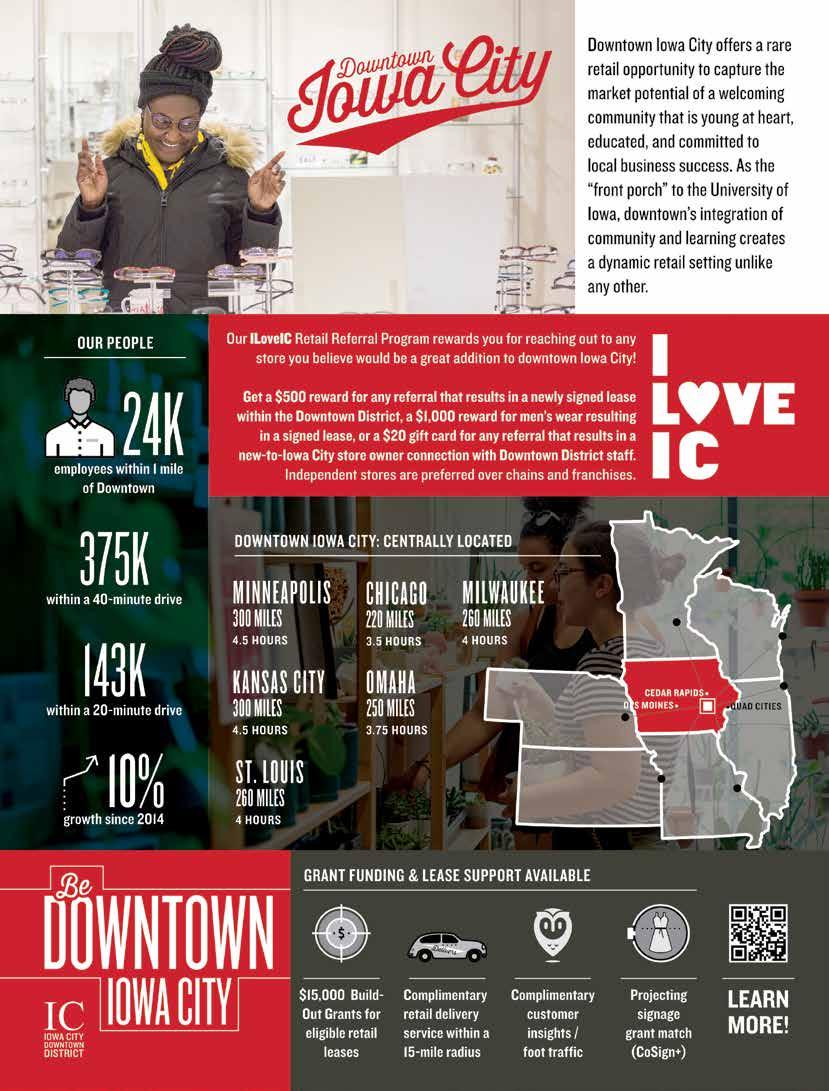
SacrAments
Praise be the ephemeral and sacred moments created when bread is broken and shared.
BY COURTENAY BOUVIER
As an annoyingly inquisitive child with parents who encouraged critical thinking, I struggled to believe in God. We still went to church on Church holidays, though—not out of a sense of obligation, but out of an appreciation of ritual. The multisensory stimulations of Catholic mass enchanted and mystified me, with the silk and the leather, the incense, the pipe organ, the choir, the gold and stained glass; the spectacle of hairstyles, faces, fashion; the shaking people’s hands to pass the peace; the tonguejumble of Latin, intelligible threads unknotting to cavort with sunray-shining dust motes; the kneeling, and the standing, and the sitting, and the kneeling again, and the I hope I don’t mess up and stand when everyone kneels; and oh yeah, that famous, constant Catholic guilt.
To continue the ritual, we got to go to the Kimberly Diner for breakfast. We never went out to eat, but breakfast is cheap so it was OK. I’d get poached eggs because fancy rich people ate them, and I’d sometimes even get bacon, which we didn’t eat at home. My brother got pancakes that weren’t made with bran and wheat germ and served with peanut butter and yogurt, like we had at home. We liked Mom’s panbricks fine until we learned what actual pancakes are, almost, dare I say, like a certain prelapsarian apple. My brother was so confused and enthralled by this sweet, soaring tower of glossy gold; it was a revelation, a mysterious ecstasy laid bare.
We did church every year on Easter and Christmas and on those other days around Lent, but we were mostly in it for family time and diner breakfast. My nonna, an Italian immigrant, attended church several times a week and displayed her faith all over her house, where my mother grew up. The walls and surfaces seemed held together by cataclysmic oil paintings of Jesus and Mary, by mod mid-century crucifixes and Capodimonte saints brooding over plastic-encased white brocade furniture. In the kitchen, where no one was allowed to cook except for Nonna, there was a giant The Last Supper, probably velvet, above the counter where capacious colored-glass bowls and goblets held bushels of rubber and plastic fruit. One of my favorite childhood sensations at Nonna’s was the gummy tension of gently gnawing on a cluster of large rubber grapes. But many of my mom’s childhood memories in that house were of anguish and confusion, the kind that comes from knowing that your parents left their home country and hadn’t returned, hadn’t seen their families since they left Italy in 1925, 20 years before my mom was born. Inside that house, you could read, smell, see, hear, taste the homesickness, nostalgia, and displacement. S uch anguish was intertwined with the very Roman Catholicism whose artifacts insulated my mom’s family against a country that believed Catholics, especially the Italian immigrant ones, couldn’t truly be American and were therefore beneath even the most basic respect.
So it wasn’t surprising that my mom wasn’t big on Catholicism. Generally, though, my family really liked being outdoors, and by the time my brother and I were in high school, our family’s holy day rituals were all about keeping the things we understood and respected as holy, and discarding the things we didn’t want, like hypocrisy and damnation and even the unbridled consumerism of exchanging presents on Christmas (which sucked for a while, but seriously: Christmas is a racket). Instead, we spent time outside, together, collectively reflecting on things that exhilarated us, on places and moments that felt suffused with some sort of sacred charge, and we shared these places with each other, and we shared our stories of why they were magic and holy, and then, of course, we shared food.
Once we started that tradition, we never did go back to church. Because I didn’t have a First Communion, though, I’m not allowed to ever receive the eucharist. I have finally gotten over my curiosity about what that styrofoam disc tastes like, but I still want to know: Do priests wash their hands with scented hand soap, and isn’t that distracting if they do, with their hands all up in your face like that?
As I gradually uncoupled the mysteries, misogyny, and money of Catholicism from the sacred vibrations of its ritual, I settled on my own style of piety that had room for infinities of little gods. The entirety of the language I speak is one of my gods. Words, not in their wielding as weaponry but in their etymologies, the stories their roots tell, their dissection and examination: disassembled and reassembled, uprooted and rerooted, burrowed into, nestled in. Music, usually wordless, both the listening to and the making of, is another god. That moment when it’s deep, frigid winter but the sun shines right into your face, shining just for you—there’s a god there. Oxford commas and properly used semi-colons. Writing with the right utensil on the right paper. All animals, but especially cats. The feeling of footfalls on certain responsive
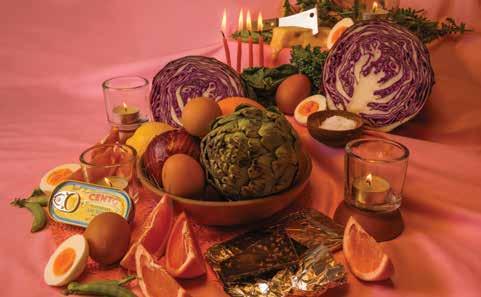
So, servers and our kin craft and recognize our own holy days, our own rituals. Sharing an impeccably ordered meal at another server’s bar on a weeknight; late-night ad hoc snack collaborations; the surreptitious handoff of a kitchen “mistake” to a hungry colleague: these are blessings of a life whose focus is the making and sharing of food.
surfaces. A body using tools to move more smoothly through space, as in skiing or bicycling. Spring in Iowa. Clean, dry socks. And countless other godlike things, but always, always food. Food, and the infinity of entities that participate in its existence, that bring it to me, that allow me to breathe it in, that allow it to inspire me. These are my sacraments.
The Catholic definition of “sacrament” is, loosely, an event that is both spiritual and physical. The roots of the word mean “sacred mystery.” The definition of “sacrum,” the tail bone, the bottommost triangle of vertebral bone that supports the uterus, is “holy bone.” Many Catholics sanctify the uterus, that miraculous organ, while disregarding the wholeness of the human who houses it; while I universally despise and reject the anti-choice ideology nurtured by such beliefs, I appreciate the etymological connection between my sacrum and my sanctity. That bone that roots me is what holds me holy and connects me to wholeness. And when I share food with other people, I am rooted. Not to the earth, necessarily, or not only to the earth, but also to the people who grew or raised or prepared the food, the resources that allowed the food to be and to be shared, the people I share it with. In so many different ways we are offered communion through food, the earth saying, ‘Take this, my body, and eat it’. These sacraments grace us, and I say grace to these sacraments.
These sacraments are simple and do not require a holy day, or I should say that they do, in the sense that all days are holy simply because they’re days. The rituals surrounding these sacraments may be used to mark days that you hope will become holy, however. I worked in restaurants throughout my adolescent and adult life, which meant I was rarely able to share in most of the commercialized ritual days anyway, religious or otherwise. When you’ve worked in the service industry for more than 30 years, there’s no hope for Valentine’s Day, for example, to mean anything beyond a busy day at work, not that there ever should have been some special meaning for that day in the first place; from a service perspective, that’s a holy day of obligation, and you’re not getting the night off. So, servers and our kin craft and recognize our own holy days, our own rituals. Sharing an impeccably ordered meal at another server’s bar on a weeknight; late-night ad hoc snack collaborations; the surreptitious handoff of a kitchen “mistake” to a hungry colleague: these are blessings of a life whose focus is the making and sharing of food. I no longer work in a restaurant, but I was baptized in them, and their people are my congregation; my soul maintains their rhythms and their inclinations and still seeks out their fellowship.
In the best of times, a server spends their
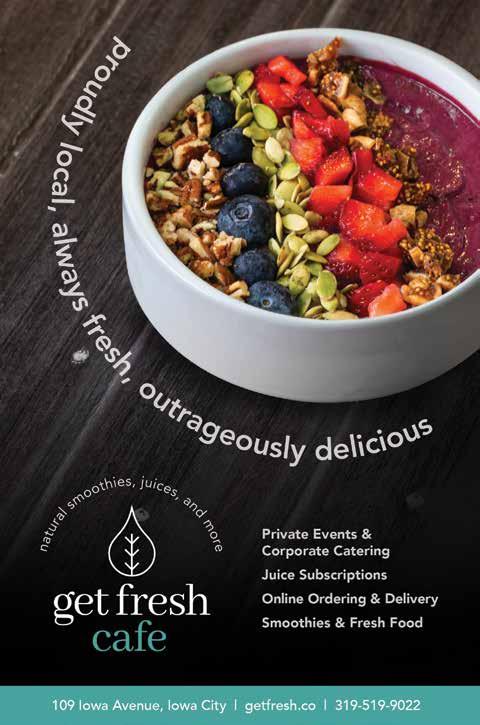
THE WEEKENDER
YOUR WEEKLY EDITOR-CURATED ARTS COMPENDIUM, A.K.A. stuff to do
IN YOUR INBOX EVERY THURSDAY LittleVillageMag.com/Subscribe
workday inviting people to put beautiful and worthy things into their bodies and then watching over them while they do so. There are distractions from this sacrament, like sore backs and landlords, but the episodes that reappear as holy moments in a server’s nostalgia montage are these sacramental moments, when we are blessed to channel the earth’s gifts through someone else’s craft, to share it with others, and to then participate in the eater’s evolving rapture as they assemble their first bites—perhaps guiding, when it’s not imposing, to suggest combining that sauce with this little morsel and making sure to also get some of the green herby stuff on the top, and honestly I truly think the cabernet franc would be alchemical with that pork, which was raised right down the road—and knowing that yes, you’re selling and you hate being sold to, but you actually completely mean it and want these people to truly understand that there is a sacrament before them.
It’s telling that the basis for Catholicism is the punishment of a woman who, seeking wisdom, chose to eat something she wasn’t supposed to. By way of a loophole certain contemporary Catholic clergy must appreciate, the Catholic Church decreed in 1574 that the fidelity or character of the person giving or receiving a sacrament is inconsequential; it is the sanctity of the sacrament itself that shines, and, when the recipient is worthy, that sacrament shines through them. So if the priest who gives you that communion wafer is somehow shady, that’s okay, because the wafer still works. And if you’re a sinner, you’re just not ready for the grace the wafer provides; keep eating those wafers and maybe you’ll get there someday. Maybe, but probably not.
Just as the holiness of a sacrament is not created by the priest, as he is merely a channel for the divine, sacraments are not necessarily things we humans cook or otherwise prepare, yet all of these things are also holy. I don’t consider the food I make for other people a sacrament, as it is fraught and neurotic, tethered to too many worldly worries, as I often am. The food I make comes from a far more fleshly, temporal love. But food I did not make, food I had no hand in preparing, food that was given to me somehow, presented by the earth via other humans who channel divinity more successfully than I do, or simply prepared by the earth itself, like coquettish golden oyster mushrooms flaunting themselves in the sun: these are my sacraments, and I receive them in blessed moments of grace that inspire, that reset my soul to zero, that take away the sins of the world, that have mercy on me.
Bright orange-yellow yolks; the goddess who lives inside each lengthwise-sliced red cabbage, outstretched arms embracing a distant moon; fish cheeks, a peerlessly pre-portioned piquant protein; the visible, gorgeously hued kinship between artichokes and thistles; bivalves, stones that eat the ocean and then feed it to us fresh from their hidden flesh, barely digested; all things involving vanilla, mostly because “vanilla” and “vagina” are derived from the same etymological root; all the magenta vegetables; things that crunch; any brassica, with their divine Fibonacci display; anything recently picked and still warm from the sun; cheese made from milk that came from cows you’ve met; really, basically all cheese; sharing any food with somebody hungry; any food that comes in its own package, like the perfection of a grapefruit or a boiled egg; food with heritage, food as nostalgia; unwritten recipes learned by smell, taste, and touch; prime rib at a supper club with lots of horseradish cream and a dear friend; gas station fried chicken somewhere in Nebraska while you’re trying to catch up to sandhill cranes; porch-dropped surreptitious delicious blessings; George’s cheeseburgers with Oasis fries, eaten outside; eating on the same property where food was raised and cooked by people I love, which probably isn’t a big deal for a lot of Iowans, but which has played a godly role in keeping me here 20 years longer than I meant to stay. Every moment there are more things, and there are also these things. These immeasurably many sacraments. It is right to give them thanks and praise.
